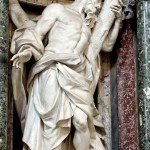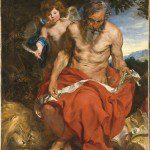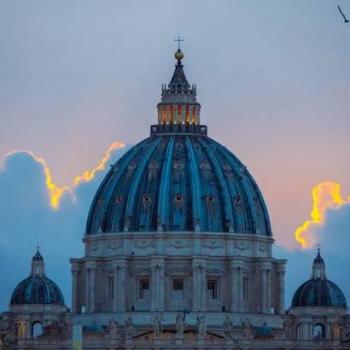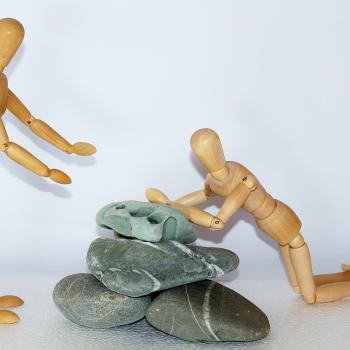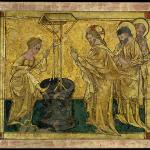![English: Moses Sees the Promised Land from Afar, as in Numbers 27:12,James Tissot [Public domain], via Wikimedia Commons](https://wp-media.patheos.com/blogs/sites/637/2017/01/Tissot_Moses_Sees_the_Promised_Land_from_Afar-178x300.jpg)
Scripture itself warns us that miracles, though worthy of consideration, can be done by those who are not following after God. False prophets (cf. Deut. 13:1-2; Matt. 24:24) will come who also perform great signs and wonders. They are indication that something unusual is going on, but they do not mean the person performing them are following God, or if they are, they will continue to do so. Judas was among those sent out by Jesus performing miracles, and so at one time was touched by God’s holiness but then left it due to his own pride and avarice:
And he called to him his twelve disciples and gave them authority over unclean spirits, to cast them out, and to heal every disease and every infirmity. The names of the twelve apostles are these: first, Simon, who is called Peter, and Andrew his brother; James the son of Zebedee, and John his brother; Philip and Bartholomew; Thomas and Matthew the tax collector; James the son of Alphaeus, and Thaddaeus; Simon the Cananaean, and Judas Iscariot, who betrayed him (Matt. 10:1-4 RSV).
In this saying, it is clear that the monk was himself not a false prophet, but one who had attained some level of holiness, so that Anthony called him great, a great pillar of the Church, but one who fell apart due to sin. He was therefore like a ship carrying goods, the goods being the graces God had given over to him which made him great, but he was unable to steer himself through the trials and tribulations in life; he had become too accustomed to what he had already obtained he swayed off course, crashing as it were into a spiritual iceberg which tore him apart. The goods remain good, they were of God, but the ship, the vessel in which they were put, cracked apart.
We must never let ourselves be thought of great due to what we have done, even if it is some great miracle; we must always remember our sins and know that even if we have repented of them, we will be tempted throughout our life, and so it is easy to once again fall short if we are not prepared to fight daily against our inordinate desires. When others praise us, we must not take notice of it, lest we too, having become great pillars, fall down and crack apart as well; thus, St Ignatius Brianchaninov warned:
Ignorant and quack ascetics think they have reached their goal when they see themselves as saints, when the world thinks and proclaims them such. They rejoice at the self-deception and self-opinion that has got into them, not understanding how fatal self-opinion is, not realizing that human praise is the sign of a false prophet. This sign is extremely important. It is given by the God-Man himself. Woe, said the Lord, Woe betide you when all men speak well of you! For that is just what their fathers did to the false prophets. Woe, spiritual woe and disaster, eternal misery! [3]
It is when we think great of ourselves we overburden ourselves with our own pride, and we will not be able to bear it long without either divesting ourselves of the pride, or finding it overburdening us and having it crush us from its weight, leading us to vainglory and many other sins. If we do something great, it is easy to think we have obtained greatness, ignoring all the spiritual cracks which remain within us, all the vices which still have influence over us, so that the fall will easily be explained by those who look over our way of life but will not be easy for us to prevent nor for us to pick ourselves back up once we have indeed fallen.
The proper spirit is one which is humble and remorseful, looking to fight temptation to the end of life, never letting minor victories or spectacles get the best of us. We can be on the path of salvation and then depart thanks to our pride. We can afloat in the stream of life, and then sink by taking too much upon our ship. We must praise God from whom all blessings flow while never assuming much for ourselves, and let God, nor anyone else, judge the quality of person we have become.
As for the monk who fell, we must remain hopeful of his salvation, because he truly mourned for his sin, and yet, because his request to have ten days to make satisfaction were not given, we must also not presume his salvation. Likewise, with ours, we must be hopeful, seeing salvation is indeed possible thanks to God’s love, while realizing that the time and place of our death will never be ours to control. The ending of the story serves as a warning more than anything else, a warning which we should all heed. The time is always right for metanoia; we must not assume we will have an extended amount of time to make things right, instead, we must find ourselves opening ourselves up to God’s grace, letting it transform us in the present instead of blocking it assuming we will have the time to do so later. We will likely not know when we shall die; we should not assume we will even have ten more days to make restitution for our sins; instead, we must do penance now, for the kingdom of God is not only at hand, but with us and beside us at all times.
[1]The Sayings of the Desert Fathers. trans. Benedicta Ward (Kalamazoo, MI: Cistercian Publications, 1984), 4.
[2] Jesus and Joshua have the same name, but one is translated from the Greek, the other from the Hebrew. Typologically it shows the prophet to succeed Moses, the messiah, is to be like Joshua, taking the people of Israel (Ecclesia, the Church) to the promised land (heaven) which Moses was unable to do. Jesus fulfilled the law of Moses by bring salvation to the world, while Joshua, the historical type representing Jesus, fulfilled the earthly mission of Moses by bringing the people of Israel to their new homeland.
[3] St Ignatius Brianchaninov, The Arena: An Offering to Contemporary Monasticism. trans. Archimandrite Lazarus (Jordanville, NT: Holy Trinity Monastery, 1997), 243.
Stay in touch! Like A Little Bit of Nothing on Facebook:
A Little Bit of Nothing


